Stephen Tobolowsky: The X Factor, Part 1
by Stephen Tobolowsky
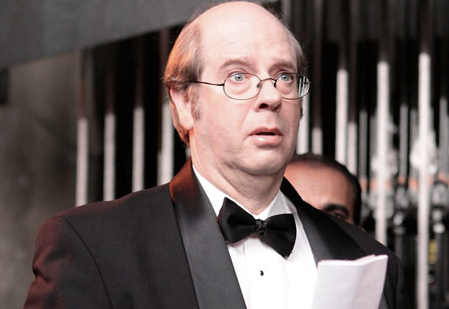
Are you a subscriber to The Tobolowsky Files? The podcast, a project of actor Stephen Tobolowsky-the youngs will know him as Sandy Ryerson on “Glee” and from “Heroes” and the olds will know him from films as diverse as Groundhog Day, Thelma and Louise and Basic Instinct-with David Chen at Slashfilm, just put out its 38th episode. Here he writes about auditions, Memento and the thrill of trying out for characters named “Masochistic Gay Man.”
Of all the gates that stand before actors, one of the most daunting is the audition. I imagine because it is the grand meeting of everything and nothing. Hopes, dreams, expectations of plenty, running into the wall of the real world with a script, producers, and a waiting room with metal folding chairs.
It is like the actor’s Cape of Magellan. I remember learning that the Atlantic and Pacific Oceans are actually at different heights so wherever they meet there is always a stormy collision of equalization. And the Cape of Good Hope was not named because you were entering a zone of peace-but it was a prayer to be uttered so that you could get to the other side alive.
I’m asked about auditions all the time, probably because they seem to be the closest thing to cruel and unusual punishment still permitted under the Constitution. How do you get them? How do you succeed at them? How can you avoid them?
Taking the last item first. You can’t. Auditions are a fact of life. This is actually very good news. Knowing that auditions are a certainty gives you the heads up to start the long torturous process of making them your friend and not your foe. As a side note, it is interesting that people who crave spending their life performing hate to perform in an audition. Why?
Usually the answer I get is that in an audition you are being judged. That’s true. But that is true for any performance art including baseball. You are always going to be judged on what you do. So, the first audition tip is you need to learn hedge your bet. By that I mean you can eliminate as many things as you can before the audition that would cause you to be judged poorly. The way you look, the way you dress. Here’s a simple one-learn your lines. This has so many positive effects you wouldn’t believe it. One, it shows producers you can learn your lines. Two, in a very sneaky, psychological way it shows the producers that you will not be a problem on the set. For producers everything is about “making the day.” Time. Time spent. Time saved. Time wasted. It may have taken you forever to learn those lines, but they don’t know that. All they know is-hey, we’re not going to lose a take because this guy doesn’t know his words.
The strange part is I have noticed if you come in with your lines learned, other non-related positive qualities are attributed to you by magic. They’ll also think you are punctual. They’ll think that costumes will fit you. They’ll think that you don’t have car trouble, that your house is clean, and that you go to the gym. Don’t ask me why this is true. It just is.
Another thing you have control over before you go in on an audition is trickier. It is clarity. For actors this means you should come in with a simple but clear interpretation of the part. The reason this is tricky is because often you will get an audition scene that doesn’t make sense-or worse-one that doesn’t even exist. I have two examples. The first happened in the late 1970’s, when I came out to L.A. My agent, Kelley Greene, who worked part time selling rain gear at the May Company, told us a play was auditioning that was going straight to Broadway. I had just moved to California, so why not get a job in New York. I remembered Lanny Flaherty at SMU, going to New York, turning around and coming back a couple days later only to go get cast in Dallas for a Broadway show a few weeks later. I chronicle this miracle in my story “Don’t Argue with the Road.”
I ran down with a couple of my friends. We had no idea what the show was, so we were ready with our contemporary and classic monologues. We got to the theater and there were about fifty other men our age waiting nervously. After a couple of hours they called me in and asked me to stand on the stage. I did. I asked if they wanted to see an audition piece. They said, “Not yet.” They asked me to turn around. I did. They whispered to each other. Nodded. They mentioned that I might be perfect for a part that didn’t exist yet but that they were currently writing for the play. My heart started racing. I asked what the part was. They said it didn’t have a name yet; they were just calling it Masochistic Gay Man.
Note to self: I think it is almost impossible to have good dialogue if your character doesn’t have a real name. This rule also holds true for big movies. Robert Patrick didn’t have a name in Terminator 2. He was just Terminator and he spent most of the movie running. I’m exhausted thinking about it and I believe it’s all because he didn’t have a name.
At the audition, the men asked me if I wanted to take a crack at Masochistic Gay Man. I said sure. They wanted me to improvise a speech. I said-what on? They said, “Have you ever wanted to have your head shoved into a urinal? Then dragged back into a stall where you beg to be beaten and anally raped”?
I paused while I waited for a consecutive translation in earth-speak. Nothing entered my head. I eventually apologized and left the stage.
* * *
The second unusual audition requires a brief back-story. I include it because the back-story itself has good bits of advice in it. When I first arrived in Los Angeles I took an acting class from Maria Gobetti. Maria was referred to me by Ed Kaye Martin. Ed served as an acting guru/dungeon master for my one memorable semester at the University of Illinois. Ed always said that actors should try to stay in acting class if you can-not just to keep sharp for auditions but for networking. The first day I arrived in Los Angeles I called Maria and enrolled in her Sunday morning class. I showed up bright and early-10 a.m. At 10:30 a young man entered class and asked Maria if he could make an announcement. They were doing a play in Hollywood that was opening in a week and they lost one of their actors-was anyone interested in jumping in. I raised my hand. The networking worked. Ed was right again. By the end of my first day of acting class I was able to call my parents and my girlfriend and report that I had landed the role of Dudley Bostwick in “The Time of Your Life,” a great play by William Saroyan and I would open in a week.
The play took place in a bar. I had to make a dramatic call from a pay phone. Fortunately, the theater had a real pay phone on the wall, so they just worked it into the set. My part was pretty simple. I sat on stage for two hours and pretended to drink beer. I make the dramatic phone call. Then the girl I call comes over and we go off together.
Opening weekend we were very excited when we heard that there was a real agent and a casting director in the audience. The play began. I sat and drank ginger ale for an hour, then the moment arrived. I went to the phone-I put in a quarter (a real quarter, which I had to provide) and then began my speech.
About two sentences into the monologue the pay phone fell off of the wall. The audience gasped. I bent over and picked up the entire phone off the floor, cradled it in one arm and picked up the receiver. I improvised brilliantly saying, “Sorry darling the phone just fell on the floor. Can you hear me all right… good.” A moment later the cord that connected the handpiece fell on the floor, leaving me holding a huge pay phone and a completely unattached receiver. A little girl in the audience said, “Mommy, the phone is broke.” The audience laughed. I continued with my speech, walking around the stage carrying a pay phone. When I finished the call I handed the huge phone to the man playing the bartender who also improvised brilliantly saying something like, “Here, pal. Let me take that phone off your hands.” The play ended. Backstage I got a lot of sympathy but no prescription drugs to kill the pain.
The next day, besides fielding all of the embarrassing calls from family and friends on how the show went, believe it or not, I got a call from the casting director in the audience. She thought I handled a difficult situation well and wanted to know if I would come in and read for a part in a movie she was casting.
Message to young actors: When you first come to L.A. and you start to despair, remember the X-Factor. Hollywood is not like school. There is no syllabus and there are no grades-here you can succeed by complete failure.
This was my first real movie audition. It was for the movie The Love Bug 2. I would be reading for the part of Officer Bailey, apparently some sort of policeman. The audition was for the very next day. I was nervous. Again the phone calls went out to loved ones. My first week in L.A. I was in a play and maybe a movie.
I was so excited I called up Ed Kaye Martin for emergency audition advice and I will now pass it on to you. He said: Read the entire script. Many actors just read their part and don’t take the time to read the whole script. If you read the entire piece you will get a feel for the overall tone and you will see what other characters in the script say about you.
I drove over to Paramount and went to the casting office and said I wanted to read the entire script before auditioning. The secretary was not particularly impressed, but he handed me a copy of Love Bug 2. I took it home and read it. The tone was predictably that of a movie that starred a Volkswagen. I couldn’t get a bead on what other characters’ said about Officer Bailey because I couldn’t find Officer Bailey in the script-at all. I panicked. I went back the next morning and asked the casting director if I read the right script. She was apologetic and said I had the old version. She handed me a new script. My hopes rose once again. Apparently they went back and added Officer Bailey! Fabulous. I could only imagine the hilarious encounter he would have with Herbie, the Love Bug.
I sat outside the office and read it for two hours. There was no Officer Bailey in this version either. My gratitude for getting the audition was diminishing by the second. I went back into the office and politely mentioned I was still not in the script. The casting director was confused and even more apologetic. She made a phone call and got the answer. Officer Bailey was in the third re-write. A new scene that was just written. It was faxed over and she handed it to me to look at just before my audition. Believe it or not, there was still no Officer Bailey.
Now, Masochistic Gay Man was looking good by comparison. She scanned the material and said the mix up was that the part of Officer Bailey was no longer called Officer Bailey, but was changed to Cop #2.
The blood drained from my head when I realized I just lost my name. I read through the scene, and I was stunned. I had one line. Let me be more specific; I had one word. One word. I had spent the better part of 24 hours reading two complete drafts of a flying car movie all for a scene in which I had one word. That word was “Yeah.” The scene in its entirety went something like this. Herbie the Volkswagen is driving down the street then it takes off and flies over a car stopped at a traffic light. Cop #1 says to Cop #2, “Did you see that?” Cop #2 says, “Yeah.” This was my first movie audition in Hollywood.
So the good news was I had my part memorized. The director came out of the room and said, “Well, Stephen, did you read the scene?”
I said, “Yeah.”
“Do you want to give it a try”?
I said, “Yeah.”
“Here goes. Ready?”
“Yeah.”
He read Cop #1 with me. “Did you see that?”
“Yeah.”
“Good, Stephen. Good. Want to give it another shot?”
“Yeah.”
“Did you see that?”
“Yeah!”
“Excellent. You got another one in ya?”
“Yeah.”
“Did you see that?”
I didn’t get the part. Of course it is a matter of opinion as to whether the part actually existed-but the advice is the same. Make sure you know what the job is before you audition.
Next: Auditioning for Christopher Nolan.
Knowing what you are doing can give you clarity, and people in show business appreciate any kind of clarity. Once I went into an audition and they asked me what I had been doing lately, a typical audition question. Instead of going through the morass of my recent show biz history, I told them I was watching my jade tree bloom in my front yard. It only happens once every seventy-five years and it was a real treat, like seeing a shooting star on a camping trip. They immediately were interested, and I got a call back. Truthfully, not so much out of interest in the jade tree, but the clarity I displayed in telling the story conveyed the impression that I was not nervous.
That is a biggy. Being nervous. The question I get all of the time is about the sheer nerve factor of auditioning. Say you have the latest version of the script, you’ve learned your lines, and you have a simple, clear approach you believe in, and you still get so nervous you can’t execute. What do you do? First, you have to understand it is the idea that you are walking into a room with people sitting on the other side of the table judging you that is making you nervous. Right? Not completely. Once I got there early and walked into an empty room with a table in it and I got nervous. That’s when it dawned on me that the table itself is a factor. I realized I needed to turn the tables so to speak.
The solution-and this advice works for any profession you have to go on interviews for-go sit on their side of the table. Not literally, but figuratively. Don’t stand opposite them to be judged, become a collaborator. The one thing you always have in common with the producers or your employers is the project. If you make the project the most important thing in the room-not you-you will sit on their side of the table and you won’t be so nervous.
My agent called me up about a film called Memento during one of the many slow periods the industry goes through. He told me this is a very, very low budget movie with a young director, no money for actors. The part they wanted me to look at was Sammy Jankis. They told me not to be insulted. It is a part that has no lines. My agent said there was nothing really to audition with, but he could fax me a scene where Sammy is tested for amnesia and has one line. Remembering Ed Kaye Martin’s advice, I said, “I’ll read the whole script. I’m not doing anything anyway.”
The script for Memento was huge by most screenplay standards. I sat in the bedroom and started reading. I got to a scene early on that seemed exactly the same as the previous scene. I thought it was a misprint until I read in the scene description “…the lighting, costumes, camera angles, acting should appear to be exactly the same as the scene before it.” Then the new scene proceeded differently. I was amazed and had no idea what I was reading.
I called out to my wife, Annie, “Hey, I’m reading the script. It is either very, very bad or very, very good.”
She laughed downstairs and said, “Which do you think it is?”
“We shall see.” I went back to reading. I got half way through and took a break. I came downstairs and started pacing. Annie said, “What’s wrong?”
I said, “It’s the script. I’m really upset.”
She said, “Is it awful?”
I said, “No. It’s not. I think it may be the best script I’ve ever read and I’m terrified it’ll suddenly become stupid. Why do they always start good and end stupid.” I finished Memento and threw it across the room. Ann heard the commotion and ran upstairs. She saw the script on the floor and me lying on the bed staring at the ceiling. She picked up the script and said to me, “Stupid?”
I shook my head, “Brilliant. Unbelievably brilliant.” I called my agent and said I had to play Sammy Jankis.
He said, “How are you going to read? There’s no scene.”
I said, just get me in to meet Christopher Nolan.
So here is an audition tip for actors, and this also cuts across to other professions where you have to interview for the job. You have to know the difference between a good script and a good pitch. There is no substitute for a good script. You can play a tiny part in a good script and it will be worth your while. You will get noticed. A good pitch is another animal altogether. It is vapor. It is just a sales job. You can play a huge part in a show that’s only a good pitch, and it could be the end of your career.
Example: Around the same time I was sent some scenes for the “Michael Richards Show.” It was a sit-com that got picked up right after the “Seinfeld” gang called it quits. All my agent said was, “This thing is going to be huge. It’s 22 on the air” (which means that the show has been bought without even waiting to see the pilot). It was Kramer as a private eye-just imagine. That was the sales pitch and not the script. The show tried to find itself unsuccessfully. They wrote and rewrote and came up with different approaches, created new characters-none of them were able to give Michael the platform he needed. I never could get in to audition because I was working. My agent was having a fit because he was sure it was the closest thing you could get in this business to finding a leprechaun and a pot of gold. But it wasn’t. They didn’t have the script. It may be overly simplistic to say if you have a script as good as Memento you will be guaranteed success-because most scripts aren’t that good, but it is fair to say if you have a good script with a good story and structure, you will develop passion. And passion is powerful on an audition. Passion is the closest thing we have to alchemy. It can turn almost anything into gold.
Christopher Nolan was one of those people I liked the moment I met him. He was soft-spoken and intelligent. There was no phoniness about him. I came into the room and the first thing he said to me was why on earth do you want to audition for Sammy Jankis-the part is tiny. I smiled and told him that it is one of the best parts in the movie. Chris laughed and asked how so.
(Note to Ed Kaye Martin: Here is where reading the entire script worked.) I said the premise of the movie is the mystery of amnesia. It is how the entire movie is structured. In every scene we wonder about Leonard (the part played by Guy Pearce-the fellow with all the tattoos) to understand who he is. That is the entire thrust of the story and he is trying to solve that mystery by understanding Sammy Jankis. Sammy is a key and the death of Sammy’s wife is one of the most horrifying and heartbreaking scenes I have ever read. Chris nodded quietly and said, “Very good. So what are you going to read for me? I’m sorry there’s not more here.”
I put the script on the ground and told Chris, “Oh, I’m not going to read for you, that wouldn’t be helpful, but I will tell you this. You may consider a lot of different actors to play Sammy but I am the only one you will meet that actually had amnesia.”
That caught Chris’ attention. He said, “You had amnesia?”
“Yes, sir.”
“For real?”
“Yeah. I had a kidney stone a few years ago and they had to do some surgery. They used an experimental drug on me that didn’t put me to sleep but gave me amnesia. I would still experience the pain but would forget about it-kind of like a bad relationship. But like any general anesthesia, for three, four days after the surgery it had to work through my system and the result was I had waves of amnesia. It was very unsettling. I would wake up and find myself in the living room holding an empty glass. In that moment I had no idea if I had finished drinking some water and was returning the empty glass to the kitchen-or if I was thirsty and I was taking the glass to the kitchen to fill it with water.”
Worse. I “woke up” standing over the toilet with my fly open and Junior in my hands. In that moment I didn’t know if I had to pee or if I had just finished and was ready to go back to watching the game. So I waited and then forgot again. And again. Finally Annie walked down the hallway and looked in at me. She gently told me I had finished a long time ago and it was time to zip up.
Chris was fascinated by the story of my amnesia and I believe I got the part of Sammy Jankis very much by turning the audition into a session of collaboration. But again, the secret was I believed in the project and was less concerned about how I came across in the interview.
This is a brief run down of the elements I have found most important in having a successful audition. Be prepared; understand the material as well as you can, even better than the people hiring you if possible; whenever appropriate, become a collaborator and not just another person hungry for a job or worse-hungry for acceptance.
According to the dictionary: “In an audition, the employer is testing the ability of the applicant to meet the needs of the job and assess how well the individual will take directions and deal with changes”. Deal with changes. That’s the hard part no one talks about because, by definition, changes are not what we expect. Sometimes we never even see them coming.
The latest episode of The Tobolowsky Files, a project of Stephen Toboloswky and David Chen, has just been released. You can subscribe through iTunes here or via RSS here. What’s more? You can e-mail Stephen at stephentobolowsky(AT)gmail(DOT)com.
There Are A Thousand Barry Dillers Watching You From Inside Your Computer
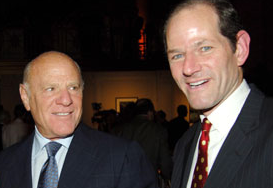
I know there are tracking bugs running on my computer because wherever I go on the Internet, I get identical ads. You probably do too! And you know why? Because you’re the pig-trough at which Barry Diller’s feeding, according to a review of secretly-installed web-tracking cookies that collect profiles for resale: “The top venue for such technology, the Journal found, was IAC/InterActive Corp.’s Dictionary.com. A visit to the online dictionary site resulted in 234 files or programs being downloaded onto the Journal’s test computer, 223 of which were from companies that track Web users…. ‘Whether it’s one or 10 cookies, it doesn’t have any impact on the customer experience, and we disclose we do it,’ says Dictionary.com spokesman Nicholas Graham. ‘So what’s the beef?’”
Shylock as Heroic Figure
“In the first half of the twentieth century, ‘The Merchant of Venice’ in Yiddish translation was probably one of the most popular productions on the flourishing Yiddish stage. Jacob Adler’s performance of Shylock was so impressive that he played Shylock in Yiddish on Broadway, with an English-speaking cast. Shakespeare, as Adler understood, was not presenting a stereotype. Shylock was a heroic figure: a Jew who boldly stood up to anti-Semites, impugning their prejudices, and challenged all the forces of the state.”
–Reconsidering the Shylock problem.
Bill Murray and "The Drug of Deadpan"
“The great discovery that [Bill] Murray has donated to cinema is that the drug of deadpan need not be a downer; bewilderingly, it can be an upper, even when you clearly have a heap of things to be down about, plus a face that looks like yesterday’s cinnamon Danish.”
–Anthony Lane.
Footnotes of 'Mad Men': "A Secretary Is Not To Be / Used for Play Therapy"
by Natasha Vargas-Cooper
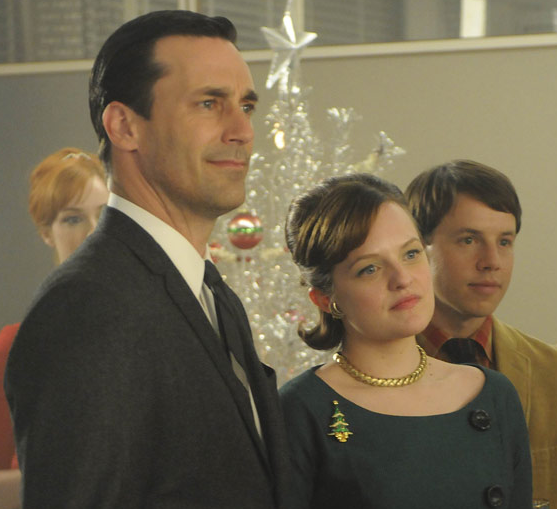
If real intimacy comes from shared vulnerability, perhaps there is nothing that makes one feel more used than false intimacy. We saw examples of this all throughout last night’s episode: the invasive psychological test that went straight for the Freudian soft spot (how do you feeeeeel about your father?); Peggy’s wormy baby-faced boyfriend cajoling her into sex; the instant kinship between creepy Glenn and Sally; and of course, the great climax featuring a broken Don Draper who, after a lonely Yuletide party, breaks all his own rules not so much for a quick plow on the couch but for a sleepover with the woman who knows what his kids want for Christmas. It’s also the betrayal of intimacy that can bring out the most savage impulses in us-why Glenn was willing to trash Betty’s kitchen, in a ploy to help Sally out of the house she hates-and I can think of few other scenarios more humiliating than having your desire for intimacy taken advantage of… especially when you’re given a half-hearted non-apology and two crisp fifties the next day.
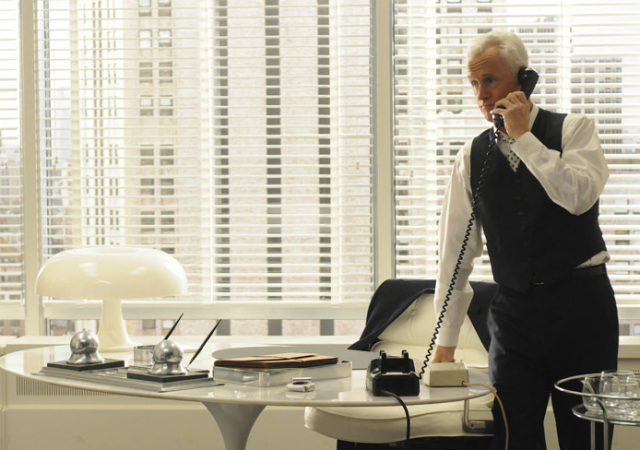
• There’s a coldness to the new digs, no? The modern design of Roger’s office serves as headquarters’ frozen center. The layout is far from cozy-it’s antiseptic, and frightfully full of symmetrical things. Roger chalks up the Stockholm style to Joan who, as we’ve learned, is a gal that prides herself on staying in touch. The Scandinavian influence was the big design fad at the time and has remained the iconic interior decor of the period (this sort of pop Scandinavian modern has also been adopted as a lingua franca of decor among young Americans today due in part to it’s unobtrusiveness and, on a different level, to a company called Ikea.) Tranquility through minimalism; uninterrupted lines, efficient instead of ornate design, neutral colors thought to soothe the eye and spirit: the critique of this sort of modernism is that it goes too far in soothing and actually numbs those who are exposed to it. It can become a visual novocaine that makes the visitor sedated but not relaxed.

• Freddy’s back (with the serenity to accept the things he cannot change and the courage to change the things he can). He’s a member of a fraternity that has only one rule for admission: a desire to stop drinking. It seems Freddy is somebody’s sponsor now, seeing as how he made a not-really discreet phonecall to his buddy at Pond’s, who had just spent an afternoon with a truly boozy Roger. We’re assuming Freddy took Roger’s advice from season two and checked himself into Hazelden. Hazelden was founded on a 217-acre farm outside of Minneapolis by a few members of Alcoholics Anonymous in 1949-it was intended for the rehabilitation of priests. But things changed fast; the American Medical Association categorized alcoholism as a disease in 1956, and Hazelden grew from 26 to 157 beds in the mid-60s. By the time Freddy would have gotten there, in 1963, their main facility was also just beginning to convert to coed. Turns out women sometimes had trouble with alcohol and drugs too… although at this time Betty Ford, who would become one of the first famous and public female faces of addiction, was just beginning to be prescribed the painkillers to which she would become addicted.
• Musical break! Here’s some advice to Don, via one of the founding texts for the ethos and aesthetics for “Mad Men”: How to Succeed in Business Without Really Trying (featuring a bushy tailed Robert Morse).
A secretary is not to be

Used for play therapy

Be good to the girl you employ, boy.

Remember no matter what

Neurotic trouble you’ve got

A secretary is not a toy. 

This play was produced in 1961. It snagged Tony Awards for Best Musical and Best Book, the Pulitzer Prize for Drama and the Drama Critics Circle Award before the movie version came out in 1967.
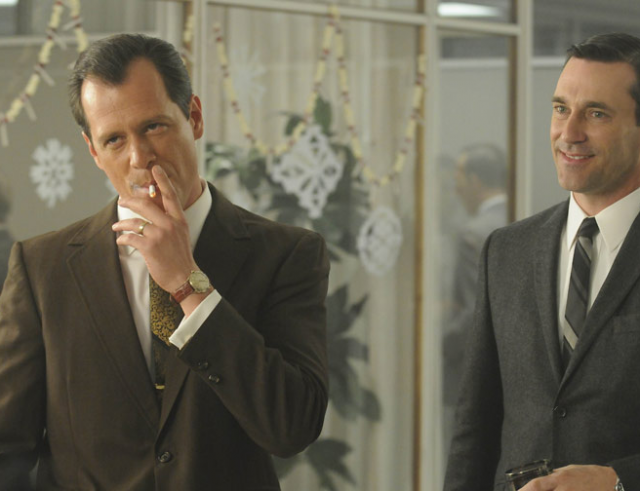
• Lee, the devious and rather evil and at-least bisexual Lucky Strike heir, got his Christmas wish: a pretty new Polaroid camera. Polaroid became a hot consumer item in the mid-sixties largely thanks to its advertising campaign by Doyle Dane and Bernbach. The ads were cheap looking and marketed the bulky camera with text heavy spreads that explained the new technology of “instant photographs.”
The team at DDB decided to focus on the pictures instead of the process. They hired photographer Howard Zieff to shoot a series of homespun pictures that gave the feel of a candid shot of typical but familiar snapshots of American family life: barefoot kids catching toads, Sunday dinners in messy kitchens, daughters giving living room dance recitals. To best communicate the simplicity of the product, the copywriters used only sentence: “It’s like opening a present.”
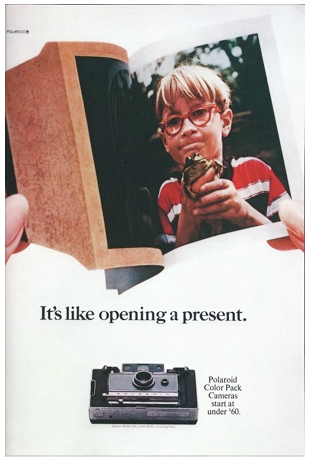
Polaroid’s TV campaign perfected the pitch. They captured moving and sentimental moments-an accomplishment in sixty seconds of commercial time about a chunk of plastic.
Polaroid sold millions of cameras for the first time in 1961.
You can always find more footnotes by Natasha Vargas-Cooper right here, or, you know, you can get a whole book of ‘em.
Jesus Plus Recession Doesn't Equal Charitable Giving

American piety, like our other established social habits, is supposed to follow a simple call-and-response pattern, depending on the overall condition of our market order. When plenitude abounds, we don’t give much thought to last things, and overall religious observance declines; conversely, when times are tough, we’re supposed to throng into the pews, imploring the Creator to straighten out our suboptimal economic prospects, and to revive our faith in the American gospel of success.
Such, at any rate, is the breathless assessment in Newsweek, which has long had a bland-yet-insatiable fascination with all things Jesus-y.
Michael Stravato gamely polls “a small number of economists and other social scientists” who have plumbed “the interplay between prosperity-and poverty-and religious observance.” The general idea is to explain a general “almost exact inverse correlation” between reported rates of observance and the performance of the gross domestic product.
Still a correlation, now matter how nearly exact it may be, is not the same thing as causation, and so Stravato caroms rather suggestibly from one social-science type to another to nail down some explanation of the pattern-because, as he puzzlingly puts it, “understanding these patterns can help us better predict the future.”
Really? It would seem that a rigidly deterministic account of how people worship in an economic crisis-what our writer calls the “no atheists in a foxhole” hypothesis-would yield fairly banal predictive results: when people are secure, they’re more independent-minded in cosmic matters, and when they feel vulnerable and dependent in the economic realm, the same would seem to hold true for the grand universal design. What’s so hard about calling that trend now, without benefit of improved pattern recognition? And indeed, the future patterns Stravato flags as useful reporting fodder seem a bit, well, deflating: “Do prosperous times produce more do-gooders? Will a lengthy economic slump pull people into the pews to pray for jobs and ladle soup for needier neighbors?”
Who knows-or cares, really? The deeper problem, it seems, is that newsweeklies have difficulty conjuring up anything other than the most stereotyped sort of spiritual responses to an economic disaster. Religiously minded people don’t tend to pull themselves into pews at the first sign of ill economic health (which, by the way, the GDP is pretty much the roughest possible measure of), and then promptly wheel around to ladle soup into the cup of the next unfortunate soul they see; they tend, rather, to lead much the same complicated and conflicted lives that their secular counterparts do.
So, to answer the awkwardly posited question about charitable behavior in a slump: It’s not noticeably on the upsurge. Indeed, the early aughts-which saw a big expansion of paper wealth, if not comparable boosts in workers’ salaries-produced the highest recent rates of reported volunteerism, according to an analysis of census data by the Corporation for National and Community Service. And for the last several years-downturn or no-it’s held fairly steady, just north of 26 percent.
Of course, volunteering, like church attendance, is something that respondents tend to lie about when pollsters start quizzing them about their virtuousness-as Stravato is also forced to concede. But even giving the reliability of the data a provisional pass, Stravato’s expert informants downplay the no-atheists-in-a-foxhole explanation: Even if overall piety shows an uptick in a recession, individual church attendance remains fairly steady, regardless of economic conditions. What’s more, churchgoing tends to be a fairly class-segmented activity, with richer and better-educated souls repairing to mainline Protestant services more frequently to count their blessings. And in a typical flourish of reporterly exoticism when it comes to sizing up the mores of our country’s lower orders, Stravato observes that “economic studies do show that the poor are fundamentalist, Pentecostal, and sectarian branches of religion. It’s not that they go to church more during hard times; it’s that they go to different kinds of churches.”
This aside actually bears the kernel of an important point-that less fortunate Americans are attracted to literalist, end-times theology and more experiential brands of Protestant worship. But Newsweek doesn’t bother following up that idea, since doing so would involve explaining the appeal of distinct religious ideas to different segments of the population, rather than treating religion as an undifferentiated, and undeviating, virtue-generating activity.
But if you repair to the excellent Slacktivist blog, however, you can find an entertaining, thoughtful and detailed breakdown of the wildly popular 11-volume “Left Behind” series of tribulation novels, which have brought many daft and fringe elements of end-times prophecy firmly into the religious mainstream. One could also consult Thieves in the Temple, the recent jeremiad by G. Jeffrey McDonald, an ordained Church of Christ minister and correspondent for the Christian Science Monitor, who argues that the consumer-friendly rise of the Rick Warren-style megachurch has bred a morally inert, socially quiescent brand of worship that’s “the spiritual equivalent of spending all day on the couch, eating cupcakes for dinner.”
It may just be, in other words, that the present market-addled strain of mainline Protestant worship just doesn’t have all that much that is useful or compelling to say to souls in economic distress. In this connection, another of Stravato’s sober academic sources, Robert “Bowling Alone” Putnam, states the crushingly obvious, as only a social scientist can: “The working class has tended to withdraw from church attendance over the past few decades, and the effects of unemployment have been concentrated among the working class.” In addition, Putnam continues-I hope you’re sitting down-”the net effect of joblessness is to cause people to be widely depressed. What I suspect is that more unemployed people are in front of the TV on Sunday morning, or, if they’re a little more with it, surfing the Web.” (Obviously, if Putnam himself were a little more with it, he’d also note the emerging trend of the unemployed founding their own dyspeptic Web outlets of cultural criticism.)
But enlisting a chorus of sociological and economic cognoscenti to make that point is very much going the long way around. As Jeff Sharlet reported back in 2005, now-disgraced megachurch Pastor Ted Haggard-who then headed up the enormously influential New Life congregation in Colorado Springs, Colo.-spelled out the litmus test for modern evangelical believers thusly: “They’re pro-free markets, they’re pro-private property…. That’s what evangelical stands for.”
Then again, to note the fusion of the believing culture and the money culture is to take both things seriously as dominant forces in American life. Better by far to gesture toward some inconclusive data, quote an expert or three, and leave the explication of actual religious ideas to whatever poor schlub tries to revive your brand under its new ownership.
Much of Chris Lehmann’s charitable work takes place right here.
Jersey Mayhem: Quiet Shore Municipality Struggles With Force Much Greater Than Itself

“It really is true, and has been proven-whether it’s a show or not-when people misbehave in public, it’s the same: The police expeditiously end their bad behavior so all the good people can enjoy their time.”
–The problem is (whether Seaside Heights borough administrator John A. Camera will admit it or not) that television networks “expeditiously” pay some people $30,000 an episode to produce bad behavior, so all the other good people can enjoy their time. This Asbury Park Press article provides a good look at how a small town’s government handles a cultural phenomenon that is at once a boon and a major pain-in-the-ass.

